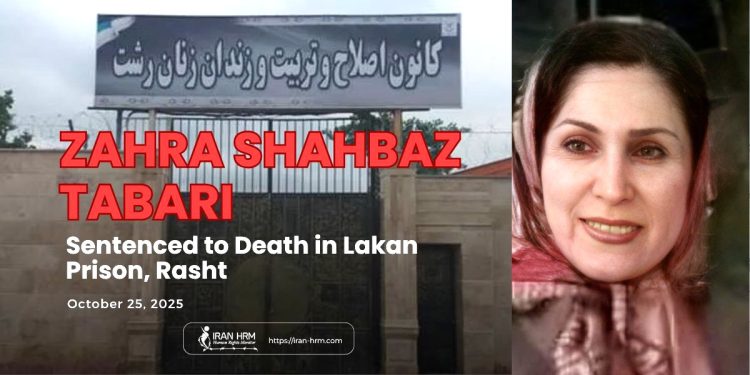In another case of severe repression against political prisoners, Zahra Shahbaz Tabari, a 67-year-old political prisoner from Rasht, has been sentenced to death by Branch 1 of the Revolutionary Court of Rasht. The court, presided over by Judge Ahmad Darvish Goftar, accused her of ‘supporting the People’s Mojahedin Organization of Iran (MEK)’—a charge frequently used by the ruling regime in Iran to suppress dissent.
A Ten-Minute Court Session Without a Lawyer
According to human rights sources, the trial was held last week via video conference from Lakan Prison in Rasht and lasted less than ten minutes. Her family reported that the court session offered no opportunity for defense, and the state-appointed lawyer did not speak a single word in her defense. The verdict of death was issued on the spot. Her son described the process as ‘a predetermined show trial.’
Arrest Without a Warrant and Confiscation of Personal Belongings
Zahra Shahbaz Tabari was arrested in April 2025 after security agents raided her home in Rasht without presenting a warrant. Agents confiscated electronic and communication devices belonging to her and her daughter. Her family remained unaware of her whereabouts and health condition for weeks following her arrest. She is currently held in Lakan Prison, known for its harsh conditions and high rate of executions.
Vague Charges and Denial of Legal Rights
The official charge against Tabari is ‘propaganda against the regime,’ a vague accusation commonly used by the mullahs’ regime to criminalize freedom of expression. Months after her arrest, no fair trial has been held, and her chosen lawyer has been denied access to her case file. She suffers from chronic health conditions, and her physical state has deteriorated due to poor medical care and psychological pressure.
Past Arrests and Security Harassment
Tabari has faced repeated arrests and interrogations over the years due to her political and family background. In this latest case, the arrest and judicial process violated multiple provisions of Iran’s Code of Criminal Procedure and international legal standards.
Human Rights Violations in Tabari’s Case
Her case represents multiple violations of international human rights instruments:
• Article 3 of the Universal Declaration of Human Rights: the right to life, liberty, and security.
• Article 9: prohibition of arbitrary arrest.
• Article 10: the right to a fair and public hearing by an independent tribunal.
• Article 5 of the ICCPR: prohibition of cruel, inhuman, or degrading treatment.
International Reactions and Campaigns
Following the announcement of the death sentence, her family issued a public statement urging international human rights bodies to intervene. Social media campaigns under hashtags such as #ZahraShahbazTabari and #StopExecutionsInIran have gained traction. Activists have appealed to the United Nations and Amnesty International to take immediate action to halt the execution.
Systematic Pattern of Repression in Gilan Province
Her case follows a disturbing pattern of political repression in Gilan Province. Judge Ahmad Darvish Goftar, known for issuing heavy sentences against political detainees—including Manouchehr Fallah—has been repeatedly criticized by human rights groups for his role in suppressing dissent.
Call to Action
Human rights organizations have condemned the death sentence as a blatant violation of the right to life and freedom of belief. They urge the international community to demand the immediate reversal of the sentence and to pressure the Iranian regime to end political executions.







